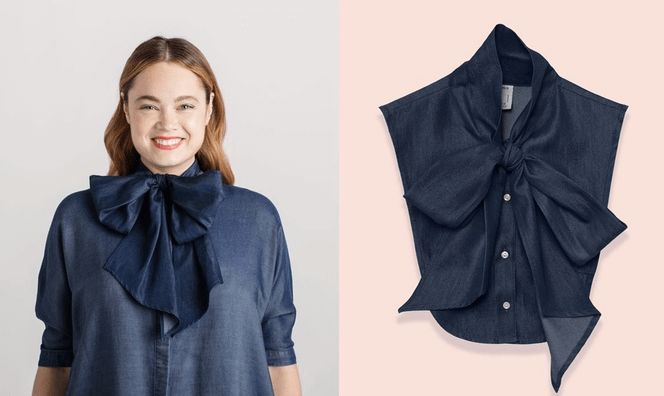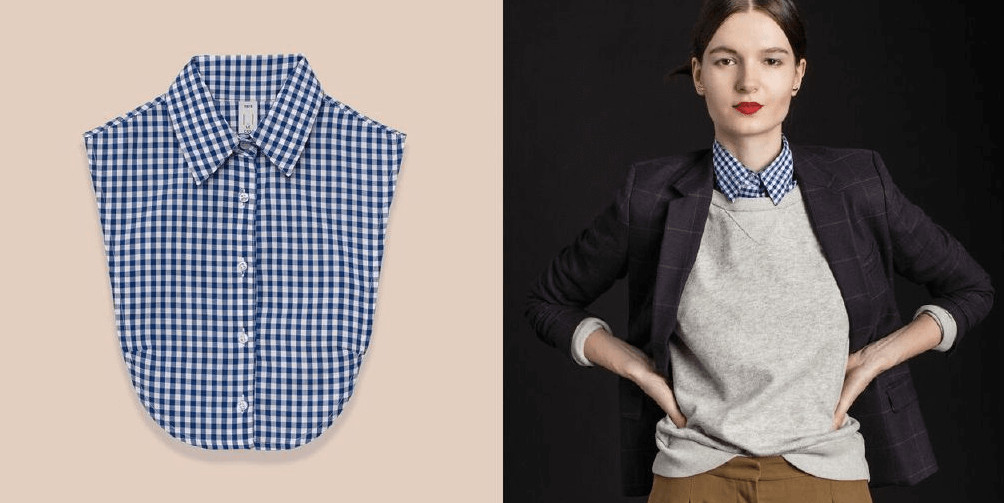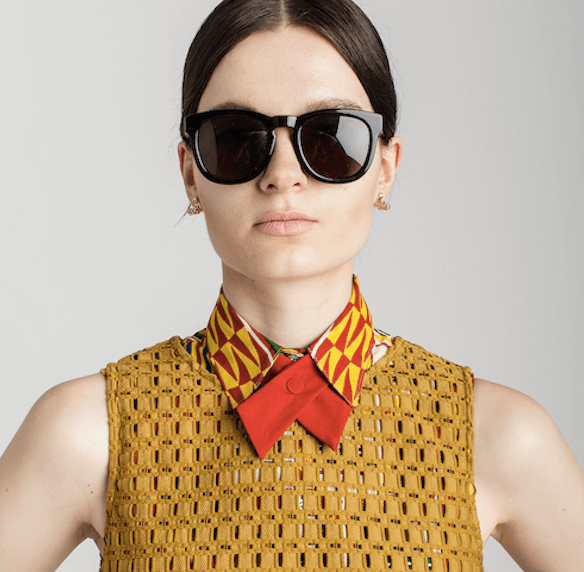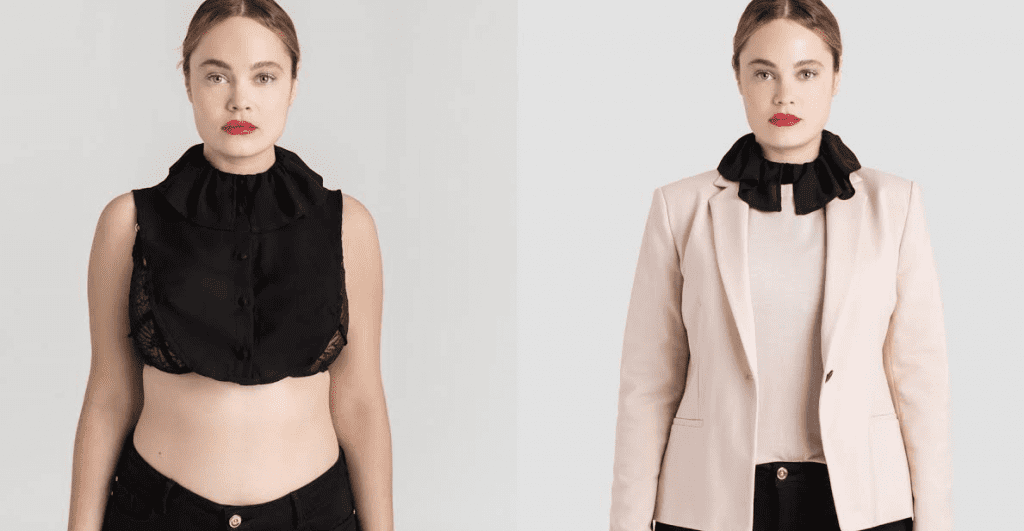Le Cou is the Fashion Dickey You Never Knew You Needed


Look at this beautiful little shirt.
You know dickeys, right? No, not the workewear apparel Dickie—the other dickey. The faux-shirts that appear in the form of collars and bows and frills that pop out from beneath your great aunt’s sweater or dress, or your uncle’s tux at your cousin’s wedding. Those dickeys. Yawn, right? No, you are wrong. Because now there is new kind of dickey—Le Cou—and it will surprise and delight you with its ability to totally change your preconceived ideas about what dickeys are and can be, and how they have subtle yet immense power to transform your most boring outfits into stunners that are much, much greater than the sum of their otherwise dull parts.
Le Cou is Elizabeth Azen Andia and Jessica Wingate and—what’s that, you don’t speak French?—also “the neck” in the language of Yves Saint Laurent, who I feel would very much be on board with the “revolutionary little shirts” that these friends of twenty years have just launched. Le Cou’s Kickstarter wraps up on December 18 but, already, Azen Andia, based in Brooklyn, and Wingate, based in Portland, Oregon, have raised more than two and a half times their goal. There is, it seems, something about these teensy swaths of attractive, well-tailored and smart fabric that all kinds of women are having some very strong reactions to.
Azen Andia and Wingate met as undergrads at the University of Oregon. “For as long as I’ve known [Wingate], she’s been super smart about collars and has had a hawk-eye for vintage,” says Azen Andia, speaking with me from Brooklyn this weekend. Though each developed their careers separately, Azen Andia in journalism, graphic design and brand identity, and Wingate in modern furniture and retail consulting, their plan from day one was to go into business together. The hard part was figuring out what to sell.


The Wakefield in Royal Blue Gingham. Image by Le Cou.
Then, one day, Wingate was talking to her mom—well, complaining to her mom, as it were—about how annoying it was that she could not wear her favorite button down beneath her sweaters; too much bunching! Too restrictive. Her mom, being the practical person she is, was like, “Oh, Jessica. What you need is a dickey!” “And this is coming from her wonderful Irish Catholic mother who wore dickeys with all sincerity growing up, and for twenty-plus years of her life,” Azen Andia tells me.
The woman was not wrong, but the friends needed anecdotal evidence beyond the Irish Catholic set and Wingate herself (who happens to poke just above five feet) that dickeys were the answer to movement-confining, shirt-bunching wardrobe woes. Then, Wingate took Europe to visit family and, inside a store that Azen Andia describes as “fashion forward”, Wingate spotted a dickey. “It sparked something in her and she thought, ‘This is what I need. It’s really great.’” Wingate rushed to her old friend with the news.
“Oh, Jessica, that’s so wild,” was her initial response. “Then the more I thought about it, the more I thought, that’s actually wildly practical—it’s just a shirt without any of the problems that traditional button-downs present for a lot of women.’”


The Wakefield in Geometrique, limited edition African Waxprint. Tie: June in red, coming soon.
So they conducted field research, presenting the fashion dickey not just to their shorter, or stouter friends, but also to their tall and willowy ones. “So quickly they got why it works. It was a wider cross-section of women that really kept responding to the idea, and encouraging us to move forward with [it], and the more people we tell, the more can’t wait to get their hands on one.”
So that was that—except, did they have to call it a dickey? Would people be confused by it? Would a brand that included the word “dick” be a hard sell? Personally, I thought the combination of “dickey” + “fashion” was brilliant specifically because it was not expected. These woman had not only a great sense of style—as indicated by the beautiful dickey images on their website—but an excellent sense of humor.
“That’s the truth, we absolutely love and seek the absurd,” says Azen Andia. “It’s who were are, and it’s for people who can say ‘dickey’ and be irreverent about it,” she says—but beyond that, it really is the solution to a wide-spread problem—the beloved, but bunchy and restrictive button down. “It’s a sincere product and simple and a straightforward idea and, ultimately, it’s just the language that’s funny.”


Miette in Black silk. Image by Le Cou.
When you take a look at Le Cou’s launch collection, you will find four brilliantly versatile collar styles that will be available in six or seven fabrics, multiple colorways, and a few patterns. Also, some bow ties and two special edition dickeys. One eye-popping number is made from a gorgeous African wax print. There are solid right angles in a swath of red, black, and yellow. Azen Andia found a New York retailer that deals exclusively in rare and smaller-batch fabrics from Africa. But the place is such a goldmine, she says, that she won’t share her sourcing secret.
“This is what you want when you’re in business for yourself, to sell stuff that you’re totally in love with and that makes a mark,” says Azen Andia. “It’s pretty lovely to have it out in the world and to watch people make that leap really quickly when they look at photos and see it in the context of the whole look, and helping people bridge that gap.”
So, weary women who love a button-down sweater combination but loath fabric discomfort—Voilà, Le Cou! It really is the little shirt that doesn’t take itself too seriously that you never knew you needed.
You might also like 




















